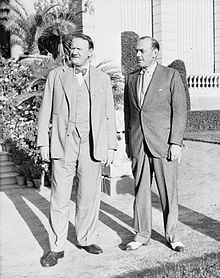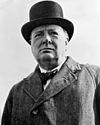- Oliver Lyttelton, 1st Viscount Chandos
-
The Right Honourable
The Viscount Chandos
KG, PC, DSO, MC
Oliver Lyttelton (right) with Sir Miles Lampson at the British Embassy in Cairo in 1941 President of the Board of Trade In office
3 October 1940 – 29 June 1941Monarch George VI Prime Minister Winston Churchill Preceded by Andrew Rae Duncan Succeeded by Andrew Rae Duncan In office
25 May 1945 – 26 July 1945Monarch George VI Prime Minister Winston Churchill Preceded by Hugh Dalton Succeeded by Hon. Sir Stafford Cripps Secretary of State for the Colonies In office
28 October 1951 – 28 July 1954Monarch George VI
Elizabeth IIPrime Minister Winston Churchill Preceded by James Griffiths Succeeded by Alan Lennox-Boyd Personal details Born 15 March 1893
Mayfair, LondonDied 21 January 1972 (aged 78)
Marylebone, LondonNationality British Political party Conservative Spouse(s) Lady Moira Osborne
(1892–1976)Alma mater Trinity College, Cambridge Oliver Lyttelton, 1st Viscount Chandos KG, PC, DSO, MC (15 March 1893 – 21 January 1972) was a British businessman who was brought into government during the Second World War, holding a number of ministerial posts.
Contents
Background, education and military career
Born in Mayfair, London, Chandos was the son of the Hon. Alfred Lyttelton, younger son of George Lyttelton, 4th Baron Lyttelton. His mother was his father's second wife Edith, daughter of Archibald Balfour. He was educated at Eton and Trinity College, Cambridge. He served in the Grenadier Guards in the First World War, where he met Winston Churchill, and was awarded the Distinguished Service Order and Military Cross.
Business career
Chandos was managing director of British Metal Corporation, at a time when it was a major shareholder in "Metallgesellschaft A.G." a German Industrial giant which financed Hitlers Nazi party. He also served as Chairman of both the London Tin Corporation and Associated Electrical Industries. In 1970 he was made a Knight of the Garter.
Political career
Chandos entered Parliament as Conservative Member of Parliament (MP) for Aldershot in a wartime by-election in 1940 and was sworn of the Privy Council the same year. He entered Winston Churchill's war coalition as President of the Board of Trade in 1940, a post he held until 1941, and then served as Minister of State in the Middle East from 1941 to 1942 and as Minister of Production from 1942 to 1945. He was again President of the Board of Trade in Churchill's brief 1945 caretaker government. After the Conservatives' 1951 election victory, he became Secretary of State for the Colonies, which he remained until 1954. The latter year he was elevated to the peerage as Viscount Chandos, of Aldershot in the County of Southampton.
Later career
Chandos then returned to Associated Electrical Industries, and steered it to become a major British company. In 1962, Chandos became the first chairman of the National Theatre, serving until 1971. He then served as president until his death. His parents had been active campaigners for its development, and the Lyttelton Theatre, part of the National's South Bank complex, was named after him.
Family
Lord Chandos married Lady Moira, daughter of George Osborne, 10th Duke of Leeds in January 1920. They had three sons and one daughter. He died in Marylebone, London, in January 1972, aged 78, and was succeeded by his eldest son, Antony. Lady Chandos died in May 1976, aged 84.
Family connections
Lord Chandos came from a very influential family:
- He was a descendant of the Grenville family, including such people as:
- Richard Temple, 1st Viscount Cobham (1675-1749), landscape designer and soldier
- George Grenville (1712-1770), Prime Minister (1763-1770), grandson of the above by his daughter Hester Grenville, 1st Countess Temple
- William Wyndham Grenville, 1st Baron Grenville (1757-1834), Home Secretary (1789-1791), Foreign Secretary (1791-1801)
- George Nugent-Temple-Grenville, 1st Marquess of Buckingham (1753-1813), Home Secretary and Foreign Secretary (1783, for three days, simultaneously)
- He was also related to the Spencer family:
- His great-great-grandfather, George Spencer, 2nd Earl Spencer (1758-1834), was Home Secretary from 1806-1807.
- His great-grandmother, Lady Sarah Spencer, was the sister of John Spencer, 3rd Earl Spencer (1782-1845) who as Viscount Althorp (his title before succeeding to the peerage) and an MP, was Chancellor of the Exchequer and Leader of the House of Commons (1830-1834), responsible for the passage of the Great Reform Bill.
- To the Gladstone family:
- His paternal grandmother, Mary Glynne, later Lady Lyttelton, was the sister of Catherine (1812-1900), wife of William Ewart Gladstone (1809-1898), four-times Prime Minister (1868-1874; 1880-1885; 1886; 1892-1894) and prolific Chancellor (1853-1855; 1859-1866; 1873-1874; 1880-1882)
- Gladstone's son was Herbert Gladstone, 1st Viscount Gladstone, Home Secretary (1905-1910)
- He was a member of the Lyttelton family:
- His paternal grandfather, George Lyttelton, 4th Baron Lyttelton was a junior minister under Sir Robert Peel.
- His cousin, Charles Lyttelton, 8th Viscount Cobham, 5th Baron Lyttelton was a junior minister under Neville Chamberlain
- His father, Alfred Lyttelton (1857-1913), played both world-class cricket and football, and was Colonial Secretary (1902-1905)
- His first cousin once removed is Humphrey Lyttelton (1921-2008), a jazz trumpeter and radio presenter.
References
- www.thepeerage.com
- Murphy, Philip (January 2008). "Lyttelton, Oliver, first Viscount Chandos (1893–1972)". Oxford Dictionary of National Biography. Oxford University Press. doi:10.1093/ref:odnb/31385. http://www.oxforddnb.com/view/article/31385. Retrieved 2009-08-08. Subscription or UK public library membership required
External links
- Hansard 1803–2005: contributions in Parliament by Oliver Lyttelton
Parliament of the United Kingdom Preceded by
Viscount WolmerMember of Parliament for Aldershot
1940–1954Succeeded by
Eric ErringtonPolitical offices Preceded by
Andrew Rae DuncanPresident of the Board of Trade
1940–1941Succeeded by
Andrew Rae DuncanNew office Minister of State in the Middle East
1941–1942Succeeded by
Richard CaseyPreceded by
The Lord Beaverbrook
as Minister of War ProductionMinister of Production
1942–1945Office abolished Preceded by
Hugh DaltonPresident of the Board of Trade
1945Succeeded by
Hon. Sir Stafford CrippsPreceded by
James GriffithsSecretary of State for the Colonies
1951–1954Succeeded by
Alan Lennox-BoydPeerage of the United Kingdom New creation Viscount Chandos
1954–1972Succeeded by
Anthony LytteltonPrime Minister
Minister of DefenceWinston Churchill (1940–1945)
Deputy Prime Minister Clement Attlee (1942–1945)Lord President of the Council Lord Privy Seal Clement Attlee (1940–1942) • Sir Stafford Cripps (1942)Chancellor of the Exchequer Sir Kingsley Wood (1940–1942) • Sir John Anderson (1943–1945)Foreign Secretary Viscount Halifax (1940) • Anthony Eden (1940–1945)Home Secretary Herbert Morrison (1940–1945)Minister of Aircraft Production Lord Beaverbrook (1940–1941)Secretary of State for Dominion Affairs Clement Attlee (1942–1943)Minister of Labour and National Service Ernest Bevin (1940–1945)Minister Resident Middle East Oliver Lyttelton (1942) • Richard Casey (1942–1944) • Lord Moyne (1944)Minister without Portfolio Arthur Greenwood (1940–1942)Minister of Reconstruction Lord Woolton (1943–1945)Minister of State Lord Beaverbrook (1941)Minister of Supply Lord Beaverbrook (1941–1942)Minister of Production Lord Beaverbrook (1942) • Oliver Lyttelton (1942–1945)Lord President of the Council 
Lord Privy Seal Chancellor of the Exchequer Foreign Secretary Home Secretary First Lord of the Admiralty Minister of Agriculture, Fisheries and Food Secretary of State for Air Secretary of State for the Colonies Secretary of State for Dominion Affairs Minister of Education Secretary of State for India and Burma Minister of Labour and National Service Minister of Production
President of the Board of TradeOliver LytteltonSecretary of State for Scotland Secretary of State for War Prime Minister
First Lord of the TreasurySir Winston Churchill (1951–55)
Lord Chancellor The Lord Simonds (1951–54) • The Viscount Kilmuir (1954–55)Lord President of the Council The Lord Woolton (1951–52) • The Marquess of Salisbury (1952–55)Lord Privy Seal The Marquess of Salisbury (1951–52) • Harry Crookshank (1952–55)Chancellor of the Exchequer Rab Butler (1951–55)Foreign Secretary Sir Anthony Eden (1951–55)Home Secretary
Welsh SecretarySir David Maxwell Fyfe (1951–54) • Gwilym Lloyd George (1954–55)Minister of Agriculture and Fisheries David Heathcoat-Armory (1954–55)Secretary of State for the Colonies Oliver Lyttelton (1951–54) • Alan Lennox-Boyd (1954–55)Minister for Coordination of Transport, Fuel and Power The Lord Leathers (1951–53)Minister of Defence Minister of Education Sir David Eccles (1954–55)Minister of Health Harry Crookshank (1951–52)Ministry of Housing and Local Government Harold Macmillan (1951–54) • Duncan Sandys (1954–55)Minister of Labour and National Service Sir Walter Monckton (1951–55)Chancellor of the Duchy of Lancaster The Lord Woolton (1952–55)Minister of Materials The Lord Woolton (1953–55)Paymaster General The Lord Cherwell (1951–53)Secretary of State for Scotland James Stuart (1951–55)Categories:- 1893 births
- 1972 deaths
- Grenadier Guards officers
- British Army personnel of World War I
- British people of World War II
- Companions of the Distinguished Service Order
- Recipients of the Military Cross
- English Anglicans
- English businesspeople
- Knights of the Garter
- Members of the Privy Council of the United Kingdom
- Members of the United Kingdom Parliament for English constituencies
- Secretaries of State for the Colonies (UK)
- Viscounts in the Peerage of the United Kingdom
- Conservative Party (UK) MPs
- UK MPs 1935–1945
- UK MPs 1945–1950
- UK MPs 1950–1951
- UK MPs 1951–1955
- Old Etonians
- Alumni of Trinity College, Cambridge
- He was a descendant of the Grenville family, including such people as:
Wikimedia Foundation. 2010.

